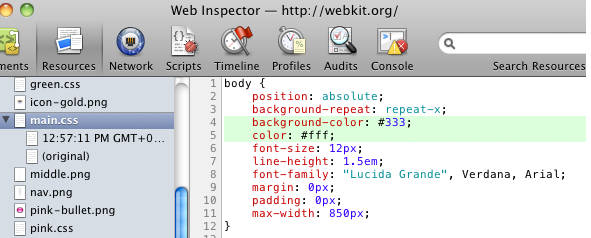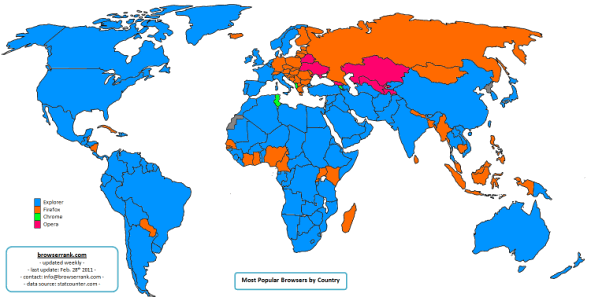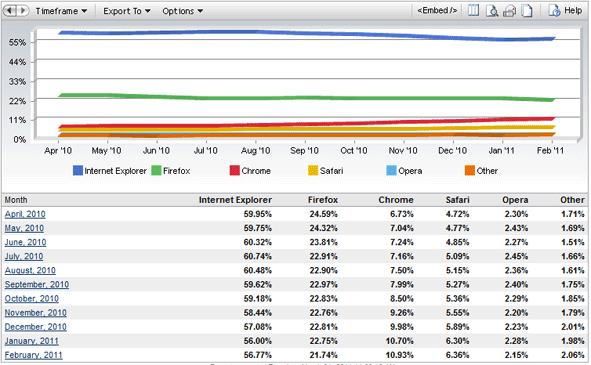Category: Safari
Onclick Javascript Does Not Work in Google Chrome and Firefox?
 If you have found that onclick event does not work on Google Chrome, Firefox and Safari web browsers, then here is quick way to fix it:
If you have found that onclick event does not work on Google Chrome, Firefox and Safari web browsers, then here is quick way to fix it:
Replace onclick form id with its name
For example, let’s say you have the following:
id=”form1″ name=”checkform1″
Find JS event:
onclick=”document.form1.cSSld.value=””
Replace with:
onclick=”document.checkform1.cSSld.value=””
All set. It now works with all web browsers.
Web Browsers Usage By Country
BrowserRank has put up a world map which displays the most popular web browsers in various countries, both desktop and mobile.
February, 2011 – Internet Explorer, Google Chrome, Safari Share Up; Firefox, Opera – Down
It’s the 1st of March already, so let’s dive into February market share data.
With the release of Internet Explorer 9 RC, Microsoft has taken some share back, up from 56.00% to 56.77% (0.77 point increase).
While everyone awaits the final version of Firefox 4, an open source web browser continues the downtrend, from 22.75% to 21.74% (1.01 point decrease).
Continue Reading
Weekly Browsers Recap + Bonus Links, February 28th

FavBrowser.com
- Download Firefox 4 Beta 12
- Big Change Coming to Google Chrome
- CTRL+F in Google Chrome Is Awesome
- Opera 11.10 Upgrades Speed Dial
- Opera Software Q4 2010 Financial Results
- How Would You Change Opera?
- Firefox 4 Final for Android Coming Soon
- Interview with Jon Von Tetzchner
- Web Inspector, Now with CSS Tracking
- Disqus Is Back
Safari Adopts WebKit2
 Back in April of 2010, Apple has announced a new version of WebKit framework which is essentially called WebKit2
Back in April of 2010, Apple has announced a new version of WebKit framework which is essentially called WebKit2
Well, it looks like the upcoming Mac OS X Lion release will feature an improved Safari web browser that finally utilizes Webkit2.
One of the main framework goals is to utilize a split process model, so the web content would be placed into a separate process. As a result, bad plugin, tab etc. won’t crash the whole web browser.
This behavior is very similar to Chrome’s; however, as split process module is directly integrated into WebKit2 framework, other clients will be able to use it as well.
Via: MacRumors
Weekly Questions Recap, February 28th

Don’t forget that you can receive points for asking/answering questions and redeem them for cool prizes.
Unresolved
Web Inspector, Now with CSS Tracking

Good news, the team behind Web Inspector has pushed a new version that improves CSS editing capabilities.
What’s new?
The Web Inspector will now show all the declared properties, even the ones that are not understood by a web browser.
Color property values can now be shown exactly as they written in an inline style.
It now uses two separate fields for property name and value.
And best of them all: the history of style sheet. This means that you can now track all the CSS changes that were made during editing.
Overall, it’s a nice update and we hope to see CSS tracking implemented into other dev tools as well.
For even more details, visit the original post.
Weekly Browsers Recap + Bonus Links, February 21st

FavBrowser.com
- IE9 RC: 2 Million Downloads
- Majority Of Web Browsers Are Unpatched
- Director of Firefox Leaves Mozilla
- Firefox 5 First Look
- Firefox 4 RC1 Coming Next Week
- Taking a Look at the New Google Chrome 10 Beta
- Gmail Now Uses Chrome’s Built-In Viewer To Open PDFs
- Introducing Google Chrome Web Search Blocklist Extension
- Download Opera 11.10
- Opera 11.10 Coming
- Windows Phone Internet Explorer 9 Mobile vs. Safari
- Opera Mini for iPad
Weekly Questions Recap, February 21st

Don’t forget that you can receive points for asking/answering questions and redeem them for cool prizes.
Unresolved
- Web-browser battle: which are you using and why?
- Suggest some skin/theme for firefox, opera, chrome?
- Why does Opera fail to grab a good per cent of user base like IE/Firefox/Chrome?
- What was the first browser you ever used?
- Help to Disable Panel While Checking Feeds?
Answered
Majority Of Web Browsers Are Unpatched
 Wolfgang Kandek, CTO of security risk and compliance management provider Qualys, revealed that approximately 80% of web browsers are susceptible to exploits of bugs that have already been patched. Kandek attributed this mostly to Windows, saying “All the different patching mechanisms are confusing, a bit of this and some of that.”
Wolfgang Kandek, CTO of security risk and compliance management provider Qualys, revealed that approximately 80% of web browsers are susceptible to exploits of bugs that have already been patched. Kandek attributed this mostly to Windows, saying “All the different patching mechanisms are confusing, a bit of this and some of that.”
As discovered by BrowserCheck (which scans Windows, Mac and Linux machines for vulnerable browsers along with browser plug-ins), Oracle’s Java was the most probable plug-in to be outdated for the second year in a row, comprising a total of 40% scanned systems. Adobe’s Reader and Apple’s QuickTime were second and third, taking up 32% and 25% respectively.
Proposed solutions include:
- Microsoft taking charge of patching crucial third party plug-ins via single updater.
- Moving to HTML5, so browsers would no longer require various audio and video processing plug-ins.





